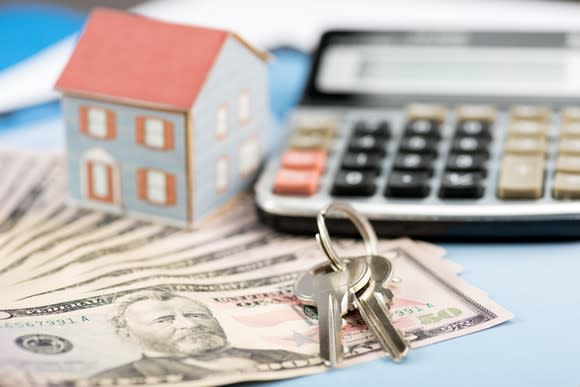3 Reasons to Use an Adjustable-Rate Mortgage
For the majority of homebuyers, a fixed-rate mortgage is a better option than an adjustable-rate mortgage, or ARM. However, there are some situations when the adjustable-rate option could make good financial sense. Here are three situations in which an ARM might be the right mortgage for you.
You don't plan on owning the property for long
An adjustable-rate mortgage can be a smart idea if you're virtually certain that you won't own the house beyond the introductory rate period. In other words, if you're sure you'll move in four years, a 5/1 ARM could be a good move for you.

Image source: Getty Images.
As an example, I had a friend in college who bought a condo because doing was cheaper than paying rent. He knew that he wanted to move to New York after graduation in three years, so he used an ARM to finance the condo in order to keep his payments low.
All other factors being equal, an adjustable-rate mortgage tends to have a significantly lower interest rate than a corresponding fixed-rate loan. As of April 25, 2018, the average APR on a 30-year fixed-rate mortgage is 4.73%, while the average APR on a 5/1 adjustable-rate mortgage is just 4.1%. On a $200,000 mortgage, this is the difference between monthly principal and interest payments of $1,041 and $966 -- a significant savings.
You have reason to believe your credit will improve
Another valid reason for considering an adjustable-rate mortgage is if you have so-so credit now, but believe your credit will be significantly better by the time your initial rate period is over.
For example, it's fairly common knowledge that most negative items drop off your credit after seven years. If you have a few charge-offs on your credit report that are five years old, there's reason to believe that your credit will jump substantially higher in two years, provided that you're responsible between now and then.
The reason this can be a smart idea is that mortgage rates offered to borrowers can vary dramatically depending on credit. According to myFICO.com, the average borrower with an 800 FICO score, which is considered to be top-notch credit, can expect a 30-year mortgage rate of just 4.19%. On the other hand, a borrower with a 620 FICO score, which is generally the minimum for a conventional mortgage, can expect an APR of 5.78%. With a $200,000 mortgage, the higher rate means a monthly payment that's nearly $200 more.
Of course, by obtaining an ARM with the goal of refinancing, you're taking the risk that market interest rates will rise between now and when you're ready to refinance. However, with the difference in rates available to low-credit and high-credit borrowers, it could potentially be a risk worth taking.
If mortgage rates are high when you buy your home
As a general rule, adjustable-rate mortgages are smarter choices when interest rates are higher. Here are a couple of good reasons for this:
If interest rates are high when you obtain an ARM, the likelihood of a sharp increase when your rate resets is much lower than if rates are near record lows when you obtain the loan. In fact, if rates fall, your payment could even adjust downward.
If rates are historically high when you obtain an ARM, it can be smart to take advantage of the temporary reduced interest rate initially, with the goal of refinancing into a fixed rate when rates eventually normalize.
The takeaway
The general theme here is that an adjustable-rate mortgage can be a smart idea if you don't plan to keep the loan beyond the initial "teaser" rate period, either through selling your home or refinancing the loan. Under the right circumstances, an adjustable-rate mortgage can allow you to keep your monthly payments low, giving you more money to invest, save for emergencies, and to furnish and maintain your home.
More From The Motley Fool
The Motley Fool has a disclosure policy.

 Yahoo Finance
Yahoo Finance 